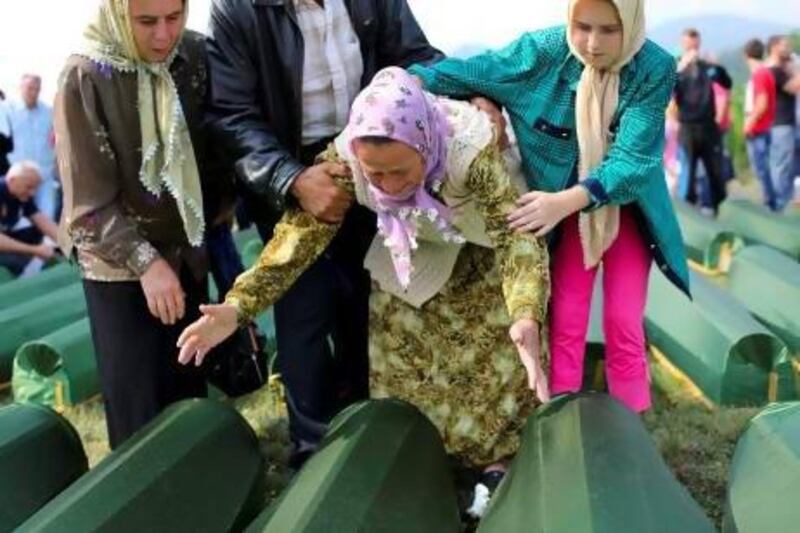POTOCARI, BOSNIA // Bosnia reburied another 409 victims of the Srebrenica massacre yesterday, but the country remains mired in ethnic disputes 18 years after Europe's worst atrocity since the Second World War.
Watched by thousands of mourners, coffins draped in green cloth were passed from hand to hand down lines of Bosnian Muslim men to be interred at the Potocari memorial centre, a forest of white marble and wooden gravestones that now number 6,066.
About 8,000 Muslim men and boys were killed by Bosnian Serb forces in five summer days in 1995, towards the end of a war that erupted in 1992 with the collapse of Yugoslavia and claimed 100,000 lives.
Some bodies have yet to be found from what became Europe's worst mass killing since the Holocaust.
Yesterday's anniversary coincided with dramatic change in the Balkans. Bosnia's neighbour, the former Yugoslav republic Croatia, joined the European Union at the beginning of the month and Serbia is on the cusp of accession talks following a landmark accord with Kosovo, its overwhelmingly ethnic Albanian former province.
Bosnia, however, trails the pack, still hostage to the ethnic politicking of rival Serb, Croat and Muslim leaders that has stifled development and kept it languishing on the margins of Europe.
Srebrenica remains an open wound, the cold facts still disputed by many Serbs.
"Innocent and helpless victims were faced with the cold and merciless hatred of criminals akin to those in the Nazi camps of Hitler's Germany," said Bakir Izetbegovic, the Muslim member of Bosnia's tripartite presidency.
"We have been asking ourselves through these 18 years - what could they have been guilty of, and to whom, in those hellish days?" said Mr Izetbegovic, who is the son of Bosnia's wartime president.
The Bosnian Serb military commander, Ratko Mladic, and his political chief, Radovan Karadzic, are standing trial in The Hague on charges including genocide in Srebrenica. Both deny that any orchestrated killing occurred.
Among those buried on Thursday were 44 boys between the ages of 14 and 18, and a baby girl who died in a United Nations peacekeeping compound. Their remains were dug from nameless death pits and identified through DNA analysis.
"I feel like I'm losing them again today," said Ramiza Siljkovic, 62, kneeling by two freshly dug graves for the remains of her two sons. "Only a handful of their bones were recovered from two mass graves."
The Srebrenica massacre was the culmination of a policy of ethnic cleansing by Mr Mladic's forces to carve a pure Serb state out of communally diverse Bosnia.
Srebrenica, located in eastern Bosnia near the border with Serbia, was a designated "safe area" guarded by UN peacekeeping troops, but they abandoned their posts in the face of advancing Bosnian Serb forces.






